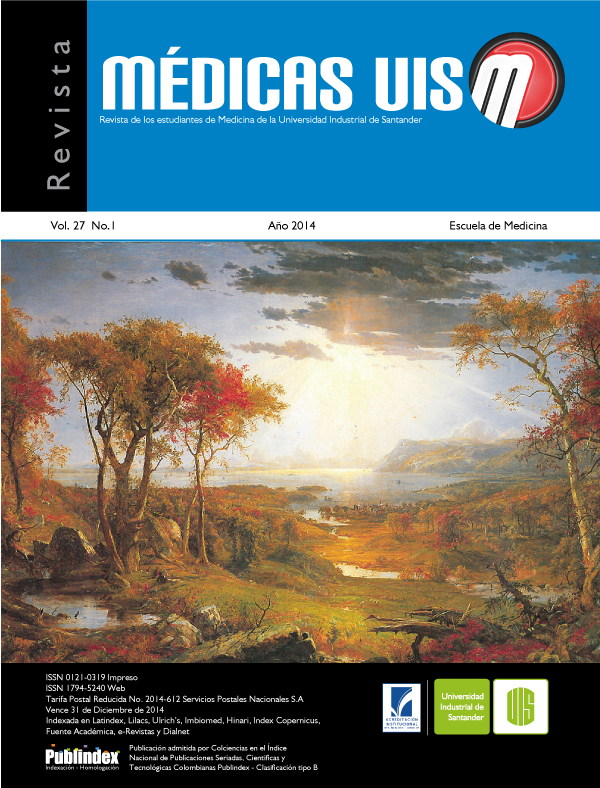Resumen
Introducción: el síndrome antifosfolípidos es una enfermedad de reciente aparición, por lo que no se cuenta con una prevalencia real, sin embargo afecta aproximadamente a 0,5% de la población, principalmente a mujeres; siendo una importante causa de trombosis arterial, venosa o de pequeños vasos y alteraciones obstétricas. Objetivo: hacer una revisión para integrar el conocimiento de los mecanismos implicados en las vías patológicas del síndrome antifosfolípidos que involucran anticuerpos y sustancias endógenas, para que sea usado en el diagnóstico y tratamiento de esta enfermedad. Conclusiones: en el síndrome antifosfolípidos participan varios componentes, entre ellos el anticuerpo anti-Beta2-Glicoproteína1, anticoagulante lúpico, anticuerpos anti-cardiolipina, anticuerpos anti-serin proteasas, anticuerpos anti-anexina A5, sistema del complemento y factor tisular, que al realizar su acción son los causantes de las manifestaciones trombóticas y alteraciones obstétricas. El entender los mecanismos de acción de dichos componentes, puede contribuir al mejoramiento diagnóstico y creación de herramientas terapéuticas para disminuir la mortalidad y morbilidad causada por el síndrome antifosfolípidos. (MÉD.UIS. 2014;27(1):43-50).
Referencias
2. Hughes GR. Thrombosis, abortion, cerebral disease and the lupus anticoagulant.Br Med J (Clin Res Ed).1983 October 15;287(6399):1088–9.
3. Mok CC, Tang SS, To CH, Petri M. Incidence and risk factors of thromboembolism in systemic lupus erythematosus: a comparison of three ethnic groups.Arthritis Rheum.2005 Sep;52(9):2774-82.
4. Horstman LL, Wenche JY, Bidot CJ, Ahnn YS, Kelley RE, Zivadinov R, et al. Antiphospholipid antibodies: paradigm in transition.J Neuroinflammation.2009 Jan 20;6:3.
5. Mulla MJ, Brosens JJ, Chamley LW, Giles I, Pericleous C, Rahman A, et al. Antiphospholipid antibodies induce a pro-inflammatory response in first trimester trophoblast via the TLR4/MyD88 pathway.Am J Reprod Immunol.2009 Aug;62(2):96-111.
6. Ruiz-Irastorza G, Egurbide MV, Ugalde J, Aguirre C. High impact of antiphospholipid syndrome on irreversible organ damage and survival of patients with systemic lupus erythematosus.Arch Intern Med.2004;164(1):77–82.
7. Koniari I, Siminelakis SN, Baikoussis NG, Papadopoulos G, Goudevenos J, Apostolakis E. Antiphospholipid syndrome; its implication in cardiovascular diseases: a review.J Cardiothorac Surg.2010 Nov 3;5:101
8. Roldan V, Lecumberri R, Muñoz-Torrero JF, Vicente V, Rocha E, Brenner B, et al. Thrombophilia testing in patients with venous thromboembolism. Findings from the RIETE registry.Thromb Res.2009;124(2):174–7.
9. Silver RM. Fetal death.Obstet Gynecol.2007;109(1):153–67.
10. Gómez JM, Aguirre N, Quintero A, Gómez J. Preeclampsia y anticuerpos antifosfolípidos.Revista Colombiana de Obstetricia y Ginecología.2000 Jul;51(3):1-5.
11. Smith GC, Crossley JA, Aitken DA, Pell JP, Cameron AD, Connor JM, et al. First-trimester placentation and the risk of antepartum stillbirth.JAMA.2004;292(18):2249–54.
12. Tripodi A, de Groot PG, Pengo V. Antiphospholipid syndrome: laboratory detection, mechanisms of action and treatment.J Intern Med.2011 Aug;270(2):110-22.
13. Ruiz-Irastorza G, Crowther M, Branch W, Khamashta MA. Antiphospholipid syndrome.The Lancet.2010 Oct;376(9751):1498-509.
14. Miyakis S, Lockshin MD, Atsumi T, Branch DW, Brey RL, Cervera R, et al. International consensus statement on an update of the classification criteria for definite antiphospholipid syndrome (APS).J Thromb Haemost.2006 Feb;4(2):295-306.
15. Lim W. Antiphospholipd antibody syndrome.Hematology Am Soc Hematol Educ Program.2009:233-9.
16. Núñez-Álvarez CA, Cabiedes J. Pathogenic mechanisms of the anti-phospholipid antibodies. Reumatol Clín.2011 Jan – Feb;7(1):72-6.
17. Levine JS, Branch DW, Rauch J. The antiphospholipid Syndrome.N Engl J Med.2002 Mar 7;346:752-63.
18. Espinosa G, Cervera R. Antiphospholipid syndrome.Arthritis Research and therapy.2008;10(6):230.
19. Gropp K, Weber N, Reuter M, el al. B2-glycoprotein I, the major target in antiphospholipid syndrome, is a special human complement regulator. Blood.2011 Sep 8;118(10):2774-83.
20. Meroni PL, Borghi MO, Raschi E, Tedesco F. Pathogenesis of antiphospholipid syndrome: understanding the antibodies. Nature reviews Rheumatology.2011 Jun;7(6):330-9.
21. Chen PP, Giles I. Antibodies to serin proteases in the antiphospholid syndrome. Current Rheumatology Reports. 2010 Feb;12(1): 45-52.
22. Oku K, Amengual O, Atsumi T. Pathophysiology of thrombosis and pregnancy morbidity in the antiphospholipd syndrome. Eur J Clin Invest.2012 Oct;42(10):1126-35.
23. Razo D. Síndrome antifosfolipidos y anticoagulante lúpico, anticuerpos antifosfolípidos. Revista Mexicana de Patología Clínica. 2000 Jul-Sep;47(3):168-71.
24. Galli M, Luciani D, Bertolini G, Barbui T. Anti-β2-Glycoprotein I, antiprothrombin antibodies, and the risk of thrombosis in the antiphospholipid syndrome. Blood Journal American Society of Hematology.2003;102:2717-23.
25. Galindo CG, Bernardez FJ, Hernández I, Ayala AR. Síndrome antifosfolipídico y reproducción humana. Ginecol Obstet Mex.2007;75(5):277-85.
26. Montero PJ, Franco V, Strauss S, de la Peña A. The antiphospholipid syndrome. Revista de Medicina Interna y Crítica.2008;5(1):27-40
27. Chamley LW, Duncalf AM, Mitchell MD, Jhonson PM. Action of anticardiolipin and antibodies to β2-Glycoprotein-I on trophoblast proliferation as a mechanism for fetal death.The Lancet.1998 Sep 26;352(9133):1037-8.
28. Brick RL. Hematological complications in obstetrics, pregnancy and gynecology. 1st Ed. New York: Cambridge University Press; 2006 Pp. 196-9.
29. Espinosa G, Cervera R, Front J, Shoenfeld Y. Mechanisms of thrombosis in the antiphospholid syndrome. Inmunología.2003;22(1):53-62.
30. de Laat B, Derksen RH, Mackie IJ, Van Heerde Wl. Annexin A5 polymorphism and the presence of anti-annexin A5 antibodies in the antiphospholipid syndrome.Ann Rheum Dis.2006 Nov;65(11):1468-72 .
31. Di Prima FA, Valenti O, Hyseni E, Giorgio E, Faraci M, Renda E, et al. Antiphospholipid Syndrome during pregnancy: the state of the art. J Prenat Med.2011;5(2):41-53.
32. Ueki H, Mizushina T, Laoharatchatathanin T, Terashima R, Nishimura Y, Rieanrakwong D, et al. Loss of maternal annexin A5 increases the likehood of placental platelet thrombosis and foetal loss.Sci Rep.2012;2:827.
33. Weiler H. Tracing the molecular pathogenesis of antiphospholipid syndrome. The Journal of Clinical Investigation.2008 Oct;118(10):3276-8.
34. Boles J, Mackman N. Role of tissue factor in thrombosis in antiphospholipid antidoby syndrome.Lupus Journal.2010 Apr;19(4):370-8.
